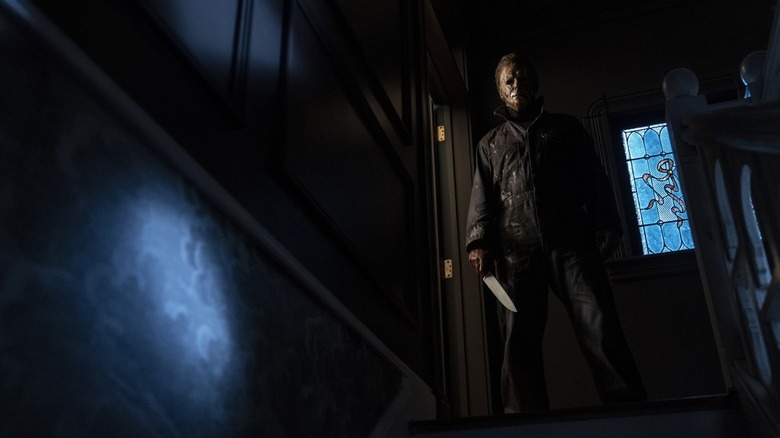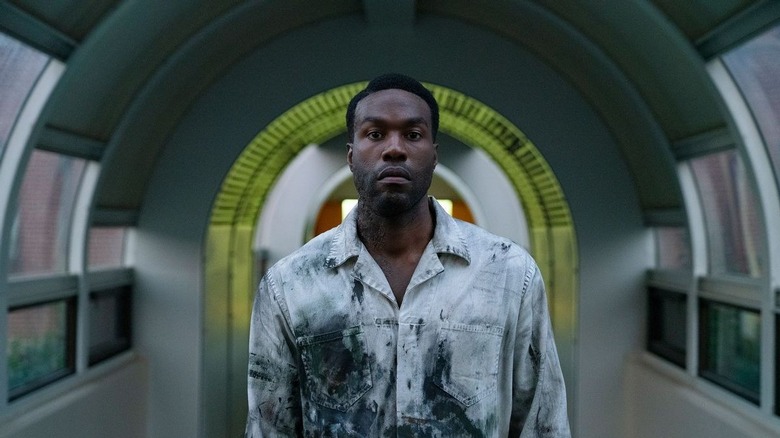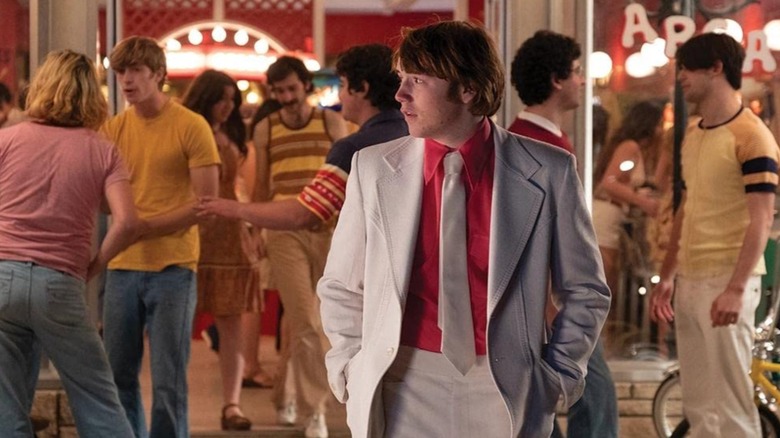The Biggest Box Office Takeaways Of 2021
2021 was a whirlwind year for cinema, especially at the box office. After movie theaters were shuttered for the majority of 2020, Hollywood began to release major new titles again in March 2021, starting with "Godzilla vs. Kong." Though consistent weekly deliveries of new theatrical releases wouldn't begin until July, the majority of 2021 has seen at least one new high-profile American title make its way to the big screen every weekend. In the process, several titles have managed to score box office hauls that would have been deemed successful even in a pre-COVID landscape. "Spider-Man: No Way Home" and its record-shattering run are especially emblematic of this, with blockbusters like that Marvel Cinematic Universe title indicating that moviegoers can and will return to theaters if there's something compelling playing on those screens.
However, the 2021 box office is not just defined by successes or even flops. Looking over the $4+ billion North American box office haul of 2021, lots of different conclusions become apparent when one breaks down how certain films were released or what genres proved reliably successful, among many other factors. As Hollywood prepares to march onward with the theatrical film slate of 2022, it's time to look at the most notable takeaways of the 2021 box office and figure out what they mean for the future of big-screen entertainment.
Simultaneous streaming releases are frontloaded affairs
2021 was the year that major studios finally started releasing movies simultaneously in movie theaters and for free on streaming services. Warner Bros. was at the forefront of this movement, launching every one of its 2021 releases theatrically and on HBO Max while Universal also dabbled in this release strategy for "The Boss Baby: Family Business" and "Halloween Kills." The biggest takeaway from seeing this approach play out over 12 months is that movies debuting alongside free streaming options have proven to be significantly more frontloaded than the average theatrical exclusive release.
By the end of July 2021, it was reported that 53% was the minimum second-weekend decline for a Warner Bros. movie dropping simultaneously on HBO Max. That sort of dip looks paltry compared to the severe second-weekend plummets that greeted later 2021 Warner Bros. releases like the 69% plunge of "The Many Saints of Newark." Meanwhile, "Halloween Kills" dethroned "High School Musical 3: Senior Year" for the obscure honor of being the movie with the highest-grossing domestic opening weekend that never cracked $100 million in the territory. The cause behind this phenomenon isn't hard to parse out: With a free streaming option, people aren't inclined to return to the theater to see a movie they like again. Meanwhile, people who didn't catch it theatrically on opening weekend are even less likely to venture to a multiplex later on. No wonder studios like Warner Bros. are abandoning this approach in 2022.
Superhero movies haven't missed a beat
Anyone wondering if the closure of movie theaters during the COVID-19 pandemic would disrupt the dominance of superhero movies got their answer thanks to the incredible success of titles like "Venom: Let There Be Carnage" and "Shang-Chi and the Legend of the Ten Rings." For the longest time, these two were the only titles of 2021 to clear $200 million domestically, but "Spider-Man: No Way Home" joined the duo after just three days of release. Not only that, but "No Way Home" became the kind of box office juggernaut that media outlets once predicted would never return to movie theaters again.
Of course, the superhero movie subgenre has never been completely invincible and wasn't bulletproof in 2021 either. The only DC Extended Universe title of 2021, "The Suicide Squad," became one of the biggest box office flops of the year. Meanwhile, the respectable but middling worldwide haul of "Eternals" will still leave it among the bottom rank of titles financially in the Marvel Cinematic Universe canon. By and large, though, superhero movies emerged from this prolonged pandemic not only scoring further box office success, but inspiring enough positive responses to make it likely the subgenre isn't going anywhere anytime soon.
Animated family movies are slowly recovering
Horror and superhero movies largely returned to the domestic box office like nothing had even happened to movie theaters since the pandemic began. Animated family movies, on the other hand, have been in a more gradual state of repair. For most of the year, these titles opened in multiplexes alongside simultaneous streaming releases that debuted in the home as well. This would explain why titles like "Raya and the Last Dragon" and "The Boss Baby: Family Business" made less in North America than past features from their respective animation houses.
However, good news for this genre emerged with "Encanto," which became the first title of 2021 not rated either PG-13 or R to crack $90 million in North America. The promising opening weekend figures for "Sing 2," which put the title on track for a $100+ million lifetime haul in this territory, also suggest that the animated family movie is starting to recover. Not so coincidentally, both of these projects were given theatrical exclusive releases. It'll be interesting to see what kind of box office future theatrical projects from heavyweight franchises like "Toy Story" and "Minions" manage to produce. For now, it's clear that it will take some time before the domestic marketplace can produce the next "Frozen." However, the steadily improving box office figures for animated family movies in 2021 indicate these titles could get there eventually.
Launching arthouse titles in wide release isn't working
In the pre-COVID theatrical landscape, the road map for releasing arthouse movies was strictly followed. Movies debuted in three to five theaters in New York City and Los Angeles, then expanded from there based on word-of-mouth and audience demand. But that formula has largely been eschewed in 2021, with distributors like Focus Features and Neon opting instead to launch titles in 500-580 theaters right away. That's a theater count that titles like "Belfast" or "The Card Counter" wouldn't usually hit until their third or fourth weekend, if ever.
Initiated to compensate for the closure of arthouse theaters in New York City and Los Angeles, among other reasons, this release strategy hasn't done much beyond kneecapping the box office potential of some of the best-reviewed movies of the year. Titles like "Titane" no longer have a chance to build up momentum and a must-see reputation. Instead, they're shoveled off into hundreds of theaters right away with minimal promotion and then dumped to make room for the next crop of doomed indie titles. While things look bleak now, there is hope on the horizon. The successful execution of the traditional slow-burn limited release of end-of-the-year titles like "Drive My Car" and "Licorice Pizza" could inspire studios to be more careful and go back to pre-pandemic release strategies with specialty titles in 2022.
The stark divide between hits and flops keeps growing
At the start of 2019, Forbes writer Scott Mendelson broke down the 2018 box office and noted that a trend had begun in late 2015 of the divide between hits and flops at the domestic box office only getting bigger and bigger. A dearth of mid-budget fare, as well as certain genres like romantic comedies becoming less prominent, meant that theatrical releases were becoming either massive successes or complete disasters, with little area in between. As a result, a small portion of titles was responsible for the majority of the domestic box office in most years since 2015.
Unfortunately, the trend Mendelson pointed out back then continued and even felt more pronounced in 2021. Three titles cracked $200 million domestically this year and, as of this writing, only eight movies cracked $150 million in the same territory. Whereas the top six movies in 2011 were responsible for only 17% of the North American box office that year, the top six movies of 2021 were responsible for nearly 35% of that territory's box office grosses. This trend meant that certain months of the year had the lion's share of their theatrical earnings attributed to one movie. Most notably, September 2021 had more than half of its box office haul come from "Shang-Chi" alone. Any hopes the pandemic could counter the worrying trend of box office success getting restricted to fewer and fewer titles never came to pass.
Anime films have gone mainstream
The art form of anime has been producing remarkable pieces of cinema for decades now, particularly from filmmakers like Hayao Miyazaki and Satoshi Kon. However, the medium hit a new level of American mainstream prominence with the box office performance of "Demon Slayer: Mugen Train." The property's rabid fan base took "Mugen Train" to a substantial $21.2 million opening weekend while the film eventually grossed $47.7 million in North America. That was enough to ensure that "Mugen Train" became the second-biggest anime film ever domestically (via CBR), only behind "Pokemon: The First Movie."
While not as lucrative as "Mugen Train," "My Hero Academia: World Heroes' Mission" dropped in October 2021 and reinforced the domestic box office appeal of these titles with a total north of $11 million in this territory. That made it only the 11th anime feature ever to clear $10 million in North America and put it well above the domestic haul of "Last Night in Soho," which "World Heroes' Mission" opened against. It's evident that there's unprecedented demand for big-screen anime productions domestically and it'll be fascinating to see how that demand impacts the box office in the years to come.
The musical was the wrong genre for the wrong time
If there was any genre especially plagued by box office problems in 2021, it was the musical. The genre just couldn't catch a break financially, starting with "In the Heights." Despite great reviews and promising pre-release buzz, the film only grossed $43.8 million worldwide. That initially seemed like it could just be attributable to "In the Heights" simultaneously bowing on HBO Max. But then "Dear Evan Hansen" cratered with only $19 million worldwide while the most surprising box office disappointment was "West Side Story," which only grossed $18.2 million after 10 days of domestic release.
Part of the problem here was that this year's musicals were grim affairs. While "Heights" and "Story" had marketing emphasizing their buzziest songs, their plots concerned heavy material like potential deportation and doomed romances, respectively. Meanwhile, the narrative of "Dear Evan Hansen" hinged on teenage suicide and nebulously defined mental health issues. Compare that to "The Greatest Showman," which grappled with generic forms of persecution (save for two explicit instances of racism) rather than specific oppression that could remind moviegoers of depressing real-world issues.
With an ongoing pandemic, movie theater patrons may have just wanted bubbly confections, not projects that dealt with weighty matters. It didn't help that titles like "In the Heights" and "Dear Evan Hansen" weren't based on musicals that the general public is especially familiar with. All in all, the musical had an off-key 2021.
It's the movie, not the release date, that dictates box office success
Before the pandemic, there was usually a predictable rhythm to which months in a given year were the biggest. Summertime months, as well as November and December, usually birthed the lion's share of the most lucrative domestic box office hits. But all bets were off in 2021 as erratic scheduling, meant to accommodate the fluctuating nature of the COVID-19 pandemic, meant that hits were cropping up all over the place. This fluid scheduling meant that months usually home to the biggest titles of a given year, namely June, were largely flat.
Meanwhile, October 2021 became the second-biggest month of the year and featured an avalanche of weekly hits (ranging from "Venom: Let There be Carnage" to "Dune") in a manner that would usually be reserved for July. Meanwhile, Labor Day weekend, which previously never saw a movie open above $26.3 million, was home to the smash hit "Shang-Chi and the Legend of the Ten Rings," which cleared $90 million in its first four days of release. Seeing this topsy-turvy distribution of hits across the calendar reaffirmed that it's often the films themselves, rather than their release dates, that explain why something is a hit. Even before the pandemic, just dropping something in July didn't make it a smash hit. The effects of COVID-19 gave 2021 a chance to exemplify this.
Sony's patient approach to releasing movies paid off
Sony/Columbia Pictures took its time before it re-entered the domestic box office game. Whereas Disney and Warner Bros. dropped titles in theaters throughout 2021, Sony/Columbia largely refrained from debuting its biggest offerings in theaters. Instead, it constantly delayed projects like "Venom: Let There be Carnage" and "Ghostbusters: Afterlife" and only brought smaller-scale projects to the big screen, like "Here Today," through its Stage 6 Films division.
What once looked like a curious strategy ended up paying off in dividends. "Venom: Let There be Carnage," the first Sony/Columbia blockbuster to arrive in theaters since the pandemic started, scored the biggest opening weekend of 2021...until fellow Sony/Columbia release "Spider-Man: No Way Home" came along. Meanwhile, "Ghostbusters: Afterlife" managed to clear $120 million in North America. The studio's sparse schedule also meant Sony/Columbia found itself devoid of major money-losing flops, the kind rival studios dealt with thanks to pandemic-era titles like "Dear Evan Hansen" or "The Last Duel."
With over $1 billion in domestic grosses, Sony/Columbia ended 2021 as the biggest studio in North America, outpacing even Disney. Despite a pared-down slate and the effects of the pandemic, Sony/Columbia's 2021 box office even outgrossed its yearly hauls from 2015 and 2016. Staying patient with its slate of titles may have initially seemed strange and frustrated some fans, but the lucrative nature of movies like "No Way Home" indicates it was the right move.
Horror remains reliable at the box office
Horror cinema had a renaissance of sorts in the years directly preceding the COVID-19 pandemic, with features like "It" and "Get Out" redefining the sort of box office success R-rated entries in the genre could achieve. After the extended closure of movie theaters, the horror movie returned to the big screen with much of its financial mojo intact. But not every new release in this domain was lucrative nor did any of these motion pictures reach the worldwide box office haul of "It."
However, several horror features this year managed to excel at the box office, including "A Quiet Place: Part II," which helped bring the domestic box office roaring back to life at the end of May 2021. There was also "Candyman," which brought its franchise to new heights financially, while "Halloween Kills" managed to prove that the 2018 "Halloween" was no fluke. Getting a good scare with friends is always fun and the consistently lucrative nature of horror films this year proved the enduring nature of that experience.
MGM came roaring back to life
MGM's had a rough time as a distributor in the 21st century, with constant financial difficulties culminating in it declaring bankruptcy in 2010. The studio finally returned to being an independent distributor in 2018, when it proceeded to release five movies across two years until the pandemic shut down movie theaters. The studio roared back to life in 2021 with a whopping seven titles released into theaters between May and December 2021, with a shocking amount of them turning in decent box office totals (only "Flag Day" outright crashed and burned).
Most notably, MGM released "No Time to Die," which cracked $160 million in North America, a significant haul that made it the fourth-biggest title from MGM in the territory. Even better, "No Time to Die" was a big enough hit internationally to briefly become the biggest movie of 2021 at the worldwide box office. But MGM's 2021 wasn't just defined by 007. "Wrath of Man" managed to crack $100 million, "House of Gucci" scored the biggest opening weekend of 2021 for an adult drama, and "Licorice Pizza" had by far the most lucrative limited release debut since the pandemic began. Not only did MGM score several box office hits in 2021, but it did so with movies that were original projects aimed at adults, a rare breed of cinema this particular year. The only dark cloud here is the impending acquisition of MGM by Amazon, which could put an end to its revived spirit in the theatrical exhibition space.
Disney continues to dominate the box office
In 2016, seven of the 13 biggest movies of the year at the domestic box office hailed from Disney. This was no anomaly, but rather a reflection of how dominant one studio had become in the North American theatrical landscape. Even in 2021, with everything going topsy-turvy for big-screen entertainment, Disney continued to dominate the box office. Six of the 10 biggest movies of the year domestically were either released by Disney or based on characters owned by the conglomerate. Disney also distributed three movies that cracked $150 million-plus in North America, the most of any studio. What a contrast to 2007, when, as pointed out by The Hollywood Reporter, the box office success in this territory was spread out much more evenly across all the major studios rather than just one corporation.
Interestingly, outfits like Warner Bros. and Universal did get to show some muscle in other territories outside of North America. Disney's financial dominance was challenged at the worldwide box office in 2021, where the studio never released a title that cracked $450 million globally, a feat five American titles from rival studios (albeit two of which starred Disney-owned characters) managed to accomplish. Still, in North America, Disney gobbled up the majority of the box office, a trend that started in 2019 – the last year of traditional pre-pandemic moviegoing — when the studio secured a whopping 33% of the global box office revenue.












